Stay in the know on all smart updates of your favorite topics.
Kennisland-podcast #1: geen vernieuwing zonder ongemak

Geen vernieuwing zonder ongemak. Maar durven vernieuwers het ongemak zelf in de bek te kijken? En wat kunnen we daarvan leren? In deze podcastserie ter ere van 25 jaar Kennisland gaan we in gesprek met sociale vernieuwers over scheve machtsverhoudingen, schijnparticipatie, gebrek aan diversiteit, preken voor eigen parochie, haperende verdienmodellen, de paradox van vernieuwing en andere olifanten in de kamer waar wíj het juist wel graag over willen hebben. In deze eerste aflevering gaat Marieke van Doorninck in gesprek met Tofik Dibi.
Eerste gast: Tofik Dibi
Tofik is een Marokkaans-Nederlandse oud-politicus, schrijver, activist en sinds 2018 bestuursadviseur van het stadsdeel Nieuw-West in Amsterdam. Hij richt zich onder andere op het vergroten van kansen van jongeren in grote steden. Tofik staat bekend om zijn gedrevenheid en is niet bang om de knuppel in het hoenderhok te gooien. Regelmatig zorgt hij met scherpe tweets voor reuring op X. Hij is bovendien lid van onze Raad van Advies. Marieke van Doorninck, directeur van Kennisland, gaat met hem in gesprek over ongemak en vernieuwing.
> “De realiteit vraagt soms om een bittere toon.”
Ongemak inzetten en toch verbinden
Ze praten over hoe je ongemak kunt inzetten om de status quo te bevragen en de gevestigde orde uit te dagen. Belangrijk daarbij is om tegelijkertijd comfort te bieden. Ongemak werkt het beste in een veilige setting. Hoe kun je de confrontatie aangaan zonder de ander te verliezen?
Luister de podcast (28 minuten) via onderstaande link.
😀Resultaten - Is betrokkenheid van de gemeenschap de moeite waard? 😀

We hebben uiteenlopende en interessante reacties ontvangen van stedenbouwkundigen, architecten en gemeenten. Als u wilt weten wat andere professionals denken, vul dan deze enquête in met uw e-mailadres en wij delen de inzichten met u.
Bedankt! 😀
Follow Playground on LinkedIn
We've received varied and interesting responses from urban developers, architects, and municipalities. If you want to know what other professionals think, please fill out this survey with your email, and we will share the insights with you.
Thank you! 😀
Highlights from the Intelligent Cities Challenge Implementation Lab

From March 4 to April 5, Amsterdam Smart City (ASC) collaborated with international peers from 77 cities across Europe in a series of online knowledge and inspiration sessions during the Intelligent Cities Challenge (ICC) Implementation Lab. The focus was on sharing best practices and building knowledge for implementing Local Green Deals (LGDs) to accelerate the transformation towards sustainability based on the principles of good governance, policy integration, partnership with local stakeholders.
Colleagues, partners, and experts from the Amsterdam Smart City network shared insights in several thematic and training sessions, including:
• Mobility & Transport Thematic Session: Pelle Menke shared the approach and lessons from ASC's Mobility Justice Challenge, while Diederik Basta introduced the City of Amsterdam's participation in the Gemini project, supporting residents in starting local, shared mobility cooperatives through a "Mobility as a Commons" (MaaC) approach.
• Local Green Deals Training Session: Egon van Wees presented Amsterdam's experience in setting up nine Impact Deals with social enterprises under the CLIMAA Local Green Deals project. The evaluation indicates that these deals have resulted in the creation of 105 jobs for people with barriers to the labor market and a reduction of 92 tonnes of CO2 emissions. Amsterdam, in collaboration with Aalborg (Denmark), also developed a framework now utilized by other cities in setting up similar Impact Deals.
• Social Economy Thematic Session: Frits Verhoef shared lessons from his involvement in two local energy cooperatives, including the pioneering work of NDSM-Energie in developing a 15MW wind park in the NoorderIJplas area, highlighting various financial and political barriers yet to be overcome. Frits also his work with MeerEnergie, a cooperative aiming to establish a heating network owned by local residents in the Watergraafsmeer district of Amsterdam, utilizing waste heat from nearby data centers.
What's Next?
Amsterdam Smart City is excited to host the ICC network in Amsterdam for a Mobility Field Visit in May, showcasing best practices for public-private collaboration in sustainable and smart mobility. We also look forward to connecting with ICC peers in person during the upcoming ICC conference in Porto in June.
More Information
For further details about the Implementation Lab and upcoming ICC activities, visit the ICC website: https://www.intelligentcitieschallenge.eu/events/icc-implementation-lab-1
Stakeholders in the Amsterdam Region interested in more information or wishing to connect to the ICC network during upcoming labs or other similar sessions can reach out to ASC International Liaison via cornelia@amsterdamsmartcity.com
Unlocking circular innovation: Launch of the Circular Innovation Collective program guide

Exciting news! We're happy to announce the launch of the Circular Innovation Collective program guide!
Launched during the #WeekofCircularEconomy2024, the guide is a practical roadmap for local governments to foster circular innovation within their cities and regions.
Gathering insights from its first pilot program in the Metropolitan Region Amsterdam, the guide offers practical and comprehensive instructions for scoping out, designing, and executing local innovation programs. Here’s what Egon van Wees from Amsterdam Impact said about the program:
"To transition to an impact economy we need to radically change our approach. We need to work with front runners and entrepreneurs that tackle societal challenges and influence the broader ecosystem. With the CIC approach you can do just that.” - Egon Van Wees, Program Coordinator, Amsterdam Impact (CIC program Funder).
Wanting to empower other cities and regions across Europe, the CIC is sharing its FREE program guide to accelerate the transition to the new circular economy.
Download the guide in the link below
The Circular Innovation Collective is a consortium of impact-driven organizations initiated by Metabolic, Impact Hub Amsterdam, and Bankers without Boundaries. With the support of the City of Amsterdam (Amsterdam Impact), The DOEN Foundation, and Goldschmeding Foundation, this initiative specifically targeted achieving 70% circular textiles in the Metropolitan Region Amsterdam by 2030. Demonstrating the potential for impactful change, CIC is now dedicated to sharing its knowledge, experience, and strategies in an open-source manner.
#circularinnovationcollective #circularcities #ventures
Open evenementen voor het testen van innovatie [Innovation wanted!]
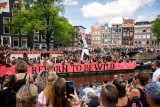
Evenementen in de stad willen we verder verduurzamen en toegankelijker maken. Vaak vinden evenementen plaats op centrale plekken waar mensen bij elkaar komen en waar veel afval, drinkwater en consumptievoorzieningen zijn. Dit zijn goede plekken om nieuwe innovaties te testen en verder te ontwikkelen. Tot 29 februari kunnen ondernemers zich inschrijven om hun innovatie te testen via het In Residence programma Open Evenementen.
In Residence programma
Innovatieve ondernemers kunnen zich inschrijven voor het In Residence programma van het stedelijk innovatieteam, waarin open evenementen in Amsterdam worden ingezet voor het testen van innovaties. Het doel van dit programma is om kennis te ontwikkelen voor zowel het verduurzamen van evenementen, als voor het vinden van praktische oplossingen voor een toekomstbestendige stad.
Geselecteerde ondernemers krijgen daarbij professionele begeleiding bij het verder ontwikkelen van hun innovatie en de mogelijkheid samen te werken met ambtenaren en evenementenorganisatoren. Voor het testen van hun innovatie krijgen ondernemers een budget tot €15.000,- toegewezen. Het programma duurt 6 maanden, van mei tot en met oktober 2024. Op 26 april worden de 8 ondernemers bekend gemaakt die dit jaar aan het programma mee zullen doen.
Het In Residence programma Open Evenementen vindt plaats in aanloop naar het jubileumjaar 2025 – het jaar van Amsterdam 750 en SAIL – dat groots gevierd zal worden in de hele stad. Innovaties die de komende tijd op evenementen worden getest en door ontwikkeld kunnen mogelijk een rol hebben tijdens de grootschalige evenementen die dat jaar plaatsvinden.
Evenementen als proeftuin
Meerdere grote evenementen nemen deel aan het programma. De organisaties van onder andere Pride en de Marathon bieden geselecteerde ondernemers mogelijkheden om innovaties op thema’s als duurzaamheid, circulair, mobiliteit, inclusie en toegankelijkheid te testen tijdens deze evenementen. Kansrijke innovaties krijgen hierdoor de mogelijkheid om door te ontwikkelen en een positieve bijdrage te leveren aan de opgaven van de stad.
Innovatieve ondernemers kunnen innovaties opgeven binnen de volgende thema's:
- Voedsel
- Circulaire materialen
- Circulaire verpakkingen
- Mobiliteit
- Inclusiviteit en toegankelijkheid
- Extreem weer
- Digitale veiligheid
Er is ook een wildcard voor een kansrijke innovatie die buiten deze categorieën valt.
De Inschrijving verloopt via: https://innovatiepartners.nl/project/open-evenementen-2024/ en sluit op 29 februari.
Meer informatie over hoe wij samenwerken met ondernemers vind je op:www.innovatiepartners.nl. Op 6 en 8 februari vinden er twee informatiewebinars plaats waarin meer verteld zal worden over het In Residence programma en de selectieprocedure. Ook is er dan ruimte om vragen te stellen.
Gevraagd: menselijke maat. Hoe de overheid een bijdrage kan leveren aan herstel van vertrouwen

Deloitte experts Channa Dijkhuis en Franklin Heijnen delen in deze whitepaper hoe de overheid een bijdrage kan leveren aan het herstel van vertrouwen en hoe de menselijke maat een verschil kan maken.
Vertrouwen is de startmotor voor dingen die vanzelf lijken te gaan. Dat de auto zal starten en de tram zal rijden. Dat de collega's zich op tijd melden voor de meeting. Zonder vertrouwen raken processen geblokkeerd. Als dat op grote schaal gebeurt, gaat er maatschappelijk heel veel mis.
Deze whitepaper gaat over de vicieuze cirkel van wantrouwen — en hoe we die vanuit de overheid kunnen doorbreken. Hoe de menselijke maat een bijdrage kan leveren aan herstel van vertrouwen en welke zaken daar een rol bij spelen.
Want hoe belangrijk instituties, wetten en procedures ook zijn: uiteindelijk gaat het om mensen en relaties. Precies daarom is de menselijke maat de onmisbare norm bij alles wat we doen.
Er ligt een grote uitdaging. Overheden zullen het goede voorbeeld moeten geven. We zullen het moeten aandurven om vertrouwen te geven, voordat we het krijgen. En op de weg daarnaartoe zijn veel obstakels te overwinnen. Maar gelukkig hoeft niemand dat werk alleen te verrichten. Herstel van vertrouwen kan alleen in samenspel gebeuren.
Want in één ding hebben wij het volste vertrouwen: de menselijke maat mag bescheiden zijn — het resultaat is groots.
Download onze whitepaper voor diepgaande inzichten in het herstel van vertrouwen en de cruciale rol van de menselijke maat.
My personal highlights and learnings from the World Smart City Expo 2023
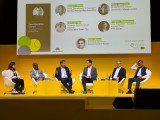
At the start of November, I was lucky enough to visit Barcelona for the World Smart City Expo 2023. Together with my Amsterdam Smart City colleagues and a group of our network partners, I organized -and took part in- keynotes, panel discussions, workshops and visits to international pavilions. As this was my second time visiting the Expo with our network, I was able to keep my focus on the content amidst the overwhelming congress hall and side activities. The following text describes some of my best insights and discoveries.
Informal Transport: Challenges and Opportunities
My mobility colleague Chris de Veer took part in a panel discussion on public transport and mobility options in urban environments. Following a plea on the implementation of micro subsidies (increasing equity and efficiency of subsidies), Chris explained the Dutch efforts to get people out of theirs cars and onto bikes and public transport, and making shared mobility solutions accessible for everyone. An important story but something I’ve been working on and getting really familiar with the past year. However, when Maria Nieto, a DU60th PhD Scholar, entered the conversation the discussion took an unexpected turn.
Maria introduced the topic of Popular, or Informal, Transport. For some years, she had been studying this topic of individuals and small scale entrepreneurs organizing ‘unregulated’ transport services. While many would say that this is ‘just chaos on the streets’ (think of the Rickshaws in New Delhi, or the moped taxi’s in Asian countries), she argued how it’s actually quite an efficient and demand responsive service. With the help of public authorities, this source of livelihood for many could be implemented in urban mobility systems. And if electric vehicle alterations would be relatively cheaper, these entrepreneurs would be happy to help make this large fleet more sustainable overnight. Furthermore, they could help please our obsession for data on travel behaviour. These drivers know exactly where people are traveling to- and from!
But where to start? Randolf Wilson, head of the Department of Transport at Kumasi Metropolitan Assembly (Ghana) and Ajoy Sharma, Principal Secretary at the Government of Punjab (India) shared stories from their own districts and how they’re trying to improve this sector. They explained how the main challenges revolve around unsafe working (& traffic) conditions and unregulated pricing mechanisms. In order to get a grip on these problems they are currently doing their best to map this sector. Unions play a key role in getting as many entrepreneurs registered as possible. Through these unions, governments are able to (micro)subsidize this growing sector, collaborate with the drivers, and ‘tidy up the chaos’.
This panel made me realize how every country and region is dealing with their own mobility challenges, and how extremely organized our own mobility system is.
Pikala Bikes in Marrakech
During the congress, I had the pleasure of meeting Cantal Bakker, founder of Pikala Bikes. With Pikala Bikes, she is introducing the city of Marrakech to cycling culture and the benefits it brings to people, their health and the city as a whole. Unknowingly, I had actually visited her repair café in March, when I travelled though Morocco.
With the help of financial income from bike tours, bike rentals, repairs and the café, Cantal is training and employing Moroccan youth in the cycling and tourism sector. At the same time, the growing presence of bikes in the urban environment inspires citizens to consider biking as a means of transport instead of the popular mopeds.
However, because the local government is still hesitant in giving cyclists more space in their infrastructure plans, she’s now putting extra effort in convincing local authorities of all the benefits a growing cycling culture could bring to the city. As this is one of the Netherlands’ great export products, we look forward to help her in connecting with Dutch ambassadors and high profile names within the Dutch cycling sector and add some persuasive power to the table!
Affordable and sustainable housing
During the final day of the Expo, I decided to join a talk on the challenges and opportunities regarding affordable and sustainable housing. While I’m not professionally involved in this sector, I do have great personal interest in this global challenge.
The panel consisted of a combination of architects, researchers and city officials. I was especially impressed by John Roberson, Chief Operating Officer for the City of Chicago. His way of talking and the Chicago projects he described were inspiring. I decided to hang on for a while afterwards to speak to him.
We had a conversation about one of the aspects of our current housing crisis that intrigues me; apart from the need for more physical buildings for housing, there also needs to be more ‘flow’ in our current housing market. There are too much house owners and tenants living in a house that’s not ‘suited’ for their current stage and situation in life. Think of; elderly who are living alone in a spacious multiple bedroom house, and a starting family cramped up in a studio. He explained to me how culture and pride make this a difficult matter; people consider their (family)homes their biggest pride and property in life. Furthermore, the longer people live and settle in a place, the harder it gets to move and build up a life and social network in a different place. To overcome this lack of flow in the housing market (e.g. elderly occupying big family homes), we shouldn’t focus on measures to get people out of their houses, but we should make housing options for elderly as attractive as possible and distributed throughout the country. Moving away from family and the social circle you’ve build up throughout life, is one of the biggest reasons not to move!
A big thank you to all people involved in making this International trip happen, and I’m excited to follow up with all the new people and organizations I’ve met! See you next year Barcelona!
23. Governance
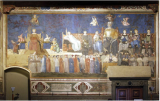
This is the 23st episode of a series 25 building blocks to create better streets, neighbourhoods, and cities. Its topic is the way how the quality of the living environment benefits from good governance.
In 1339 Ambrogio Lorenzetti completed his famous series of six paintings in the town hall of the Italian city of Siena: The Allegory of Good and Bad Government. The image above refers to the characteristics of governance: Putting the interests of citizens first, renouncing self-interest, helpfulness, and justice. These characteristics still apply.
Rooted in the community
The starting point of urban policy is a long-term vision on the development of the city that is tailored to the needs and wishes of citizens, as they become manifest within and beyond the institutional channels of representative democracy. In policies that are rooted in the community, knowledge, experiences, and actions of those involved are also addressed. Each city has a pool of experts in every field; many are prepared to commit themselves to the future of their hometown.
Participation
Governance goes beyond elections, representative bodies, following proper procedures and enforcing the law. An essential feature is that citizens can trust that the government protects their interests and that their voices are heard. The municipality of Amsterdam has access to a broad range of instruments: co-design, Initiating a referendum, subsiding local initiatives, neighbourhood law, including the 'right to challenge' and neighbourhood budgets. I will deal with participation in the next post.
Two-way communication
Barcelona and Madrid both use technical means to give citizens a voice and to make this voice heard in policy. Barcelona developed the platform Decidem (which means 'We decide' in Catalan) and Madrid made available Decide Madrid ('Madrid decides'). Both platforms provide citizens with information about the policy, allow them to put topics on the policy agenda, start discussions, change policy proposals, and issue voting recommendations for the city council.
Madrid has developed its participatory electronic environment together with CONSUL, a Madrid-based company. CONSUL enables cities to organize citizen participation on the internet. The package is very extensive. The software and its use is free. Consul is in use in 130 cities and organizations in 33 countries and has reached some 90 million citizens worldwide.
City management
Each city offers a range of services and facilities, varying from the fire brigade, police, health services, municipal cleaning services to 'Call and repair' lines, enabling residents to report defects, vandalism, damage, or neglect. Nuisance has many sources: non-functioning bridges, traffic lights, behavior of fellow citizens, young and old, traffic, aircraft noise and neighbours. In many cases, the police are called upon, but they are too often unable or unwilling to intervene because other work is considered more urgent. This is detrimental to citizens' confidence in 'politics' and seriously detracts from the quality of the living environment.
Resilience
Cities encounter disasters and chronic problems that can take decades to resolve. Resilience is needed to cope and includes measures that reduce the consequences of chronic stress (e.g., communal violence) and - if possible - acute shocks (e.g., floods) and eliminate their occurrence through measures 'at the source.'
For an adequate approach to disasters, the fire brigade, police, and ambulances work together and involve citizens. This cooperation must be learned and built up through practice, improvisation and trust and is not created through a hierarchical chain of command.
Follow the link below to find an overview of all articles.
Expeditie Muziek
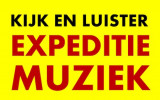
Ik heb de laatste jaren honderden posts geschreven over stedelijke ontwikkeling, innovatie en organisatie. Vele daarvan hebben op deze website gestaan. Ik verschuif mijn schrijfactiviteiten geleidelijk naar het thema waarvan mijn hart sneller gaat kloppen, namelijk muziek. In mijn nieuwe Nederlandstalige blog 'Expeditie muziek' (zie de link hieronder) verken ik wekelijk een ander facet. Deze week is dat de geschiedenis van de blues, vorige week heb ik een top tien samengesteld van de in mijn ogen mooiste Nederlandstalige liedjes 'ooit'. Neem eens een kijkje.
Join SEWF23 week (9-13 October) in Amsterdam

The Social Enterprise World Forum (SEWF) is a global annual flagship event that brings together social entrepreneurs, policymakers, investors, academics and other impact-led professionals to strengthen impact entrepreneurship and encourage systemic change.
This year, the main event takes place in Amsterdam Noord and online and is co-hosted by Amsterdam Impact, the City of Amsterdam’s impact entrepreneurship initiative, and Social Enterprise NL.
4. Informative plinths

This article is part of the series 25 building blocks to create better streets, neighbourhoods, and cities. Read how design, starting from street-level view contributes to the quality of the urban environment.
Plinths express the nature of activities inside
The visual quality, design and decoration of the plinth, the 'ground floor' of a building, contributes significantly to the quality of the streetscape and to the (commercial) success of the activities that take place at plinth level. This also applies, for example, if the activities of a workshop can be observed through the windows. Blank walls speed up visitors' pace, unless this wall has attractive art. Vacancy is disastrous.
A plinth displays the destination of a building or a part of it (photo bottom left). Fashion stores and suppliers of delicacies depend on its ability to attract buyers. There is nothing against allowing the plinth to expand slightly onto the street - think of beautiful displays of fresh vegetables - if a sufficiently wide barrier-free pedestrian route is maintained.
The total length of streets that must generate customers and visitors must not be too long in order to keeps vacancy to a minimum. This may mean that still profitable shops in streets where the number of vacancies is increasing must consider moving if revitalization of the street is infeasible. The space left behind can best be revamped into space for housing or offices to prevent further dilapidation.
Plinths of non-commercial destinations
The need for an attractive plinth also applies to non-commercial spaces. This may concern information centers, libraries, day care centers for children or the elderly, places where music groups rehearse, etcetera. Co-housing and co-working centers might also concentrate several activities in a semi-public print. In an apartment building, you might like to see an attractive portal through the glass, with stairs and elevators and a sitting area.
Residential plinths
Houses in the more central parts of the city can also have an attractive plinth. In practice, this happens often by placing plants and creating a seat on the sidewalk. The so-called Delft plinths are narrow, sometimes slightly raised additional sidewalks for plants, a bench, or stalling bicycles (photo bottom middle). The worst is if the plinth of a private house is mainly the garage door.
The aesthetics of the plinth
In many pre-war high streets, the plinth was designed as an integral part of the building. In the ‘60s and ‘70s, many retailers modernized their businesses and demolished entire ground floors. The walls of the upper floor, sometimes of several buildings at the same time, rested on a heavy steel beam and the new plinth was mainly made of glass (photo top left). Often a door to reach the upper floors is missing, complicating the premises’ residential function. Initially, these new fronts increased the attractivity of the ground floor. However, the effect on the streetscape has turned out to be negative. In Heerlen, artist and 'would be' urban planner Michel Huisman (the man behind the Maankwartier) is busy restoring old shopfronts together with volunteers and with the support of the municipality (photos top right). In Amsterdam, shopfronts are also being restored to their original appearance (photo bottom right).
Plinths policy
The sky is the limit for improving plinths, as can be seen in the book Street-Level Architecture, The Past, Present and Future of Interactive Frontages by Conrad Kicker and the *Superplinten Handbook</em> , commissioned by the municipality of Amsterdam.
In 2020, a plinth policy was introduced in the Strijp-S district in Eindhoven from a social-economic background. 20% of the available plinths is destined for starters, pioneers and 'placemakers'. Continuous coordination with the target group is important here. In The Hague, 100 former inner-city shops have now been transformed into workplaces for young and creative companies. Differentiating rents is part of the plinth policy too.
Follow the link below to find an overview of all articles.
Statiegeld op kleding: Modemerk New Optimist luidt een mode-industrie in zonder afval.

Amsterdam, 10 augustus - Op woensdag 13 september is het zo ver: met de oprichting van stichting N.E.W. (Never Ever Waste) zet New Optimist de revolutionaire stap naar statiegeld op kleding. Het statiegeldsysteem maakt 100% circulariteit mogelijk en geeft de consument de touwtjes in handen om te zorgen dat zijn of haar favoriete kledingstuk uiteindelijk weer onderdeel wordt van de mode-circle of life. New Optimist maakt het systeem toegankelijk voor andere modemerken in de nabije toekomst. Kleding hoeft nooit meer te eindigen als afval.
In de afgelopen 20 jaar verdrievoudigde de hoeveelheid afgedankte kleding in Europa van 550 duizend ton naar bijna 1,7 miljoen ton textiel, presenteert het rapport a EU-milieua-gentschap EEA begin 2023. Wat blijkt? 87% van dit afgedankte textiel, wordt vandaag de dag nog steeds geëxporteerd naar Azië en Afrika. Het merendeel belandt op stortplaatsen of informele afvalstromen.
Uit recent onderzoek verricht door Changing Marketing Foundation, wordt geconcludeerd dat Greenwashing nog altijd rijkelijk aanwezig is. Kledingstukken die netjes door de consument werden ingeleverd voor recycling bij verschillende merken, werden middels geplaatste Apple Airtags gevolgd. Het blijkt dat driekwart werd verbrand, opgeslagen in magazijnen of verscheept naar arme landen.
Volgens de uitgebreide producentenverantwoordelijkheid (UPV) voor textiel zijn kledingproducenten in Nederland vanaf 1 juli 2023 verantwoordelijk voor de textielproducten wanneer zij afval zijn geworden en moeten het afvalbeheer van deze producten organiseren. EU-milieu-agentschap EEA noemt de verschuiving van inzamelingsverantwoordelijkheid een risico. Door onverantwoorde inzamelprocessen in een aanzienlijk deel van de mode-industrie,
kan het exportvolume van afgedankte kleding alleen maar verder toenemen.
Stichting N.E.W. (Never Ever Waste)
Stichting N.E.W. is een initiatief van New Optimist, welke de statiegeld gelden beheert voor alle kledingmerken die deelnemen aan dit statiegeldsysteem. New Optimist roept andere duurzame kledingmerken op zich aan te sluiten bij Stichting N.E.W., en statiegeld in te zetten om kleding die ze op de markt brengen circulair te maken.
Om de steeds maar groeiende textiel afvalberg tegen te gaan, introduceert New Optimist Stichting N.E.W. (Never Ever Waste): het eerste statiegeld platform voor kleding. Dit nieuwe systeem garandeert dat jouw kleding wordt gerecycled en dat je het hele proces tot aan recycling kan volgen. Met een kledingstuk met statiegeld maak je de mode cirkel 100% circulair en laat je aan iedereen zien dat kleding niet als afval hoeft te eindigen.
Candour.Digital
New Optimist, pionier in het veranderen van de mode-industrie, heeft dit digitale statiegeldsysteem ontwikkeld, in samenwerking met Cadour.Digital voor Stichting N.E.W.
Candour.Digital is een IT-startup die zich richt op digitale product paspoorten. Door slim gebruik van QR-codes en blockchain technologie, kunnen individuele kleding stukken in de hele levensloop gevolgd worden.
Geen circulariteit zonder jou!
Hoe werkt het statiegeldsysteem?
1. Productaanschaf
Bij aankoop van een New Optimist kledingstuk met statiegeld wordt er een klein bedrag extra berekend. Het statiegeld varieert tussen de €2.5 en €10, afhankelijk van de prijs van het kledingstuk. Op de hangtag van het kledingstuk is zichtbaar hoeveel statiegeld op het kledingstuk zit. Je kan dit ook zien door het QR label te scannen
2. Items retourneren
Wanneer het artikel niet meer gedragen wordt,
kan het kledingstuk worden ingeleverd om het een tweede leven te geven. Dit kan bij aangesloten winkels of met een retour procedure via New Optimist.
3. Een nieuw leven
Het maakt niet uit in welke staat het item is. New Optimist bekijkt of het nog tweedehands verkocht kan worden (ook dat kan gevolgd worden via de QR-code), maar uiteindelijk wordt de kleding vervezeld en verwerkt tot nieuwe garen. Niks gaat verloren. 100% circulair!
Via de QR-code kan circulaire route van elk kledingstuk worden gevolgd.
YES statiegeld. NO textile waste!
New Optimist
Voor New Optimist is circulariteit, naast lokaal en sociaal ondernemerschap, al vanaf de oprichting in 2020 bepalend. De mode van New Optimist is ontworpen voor circulariteit:
het merk zorgt ervoor dat elk kledingstuk voor 100 procent gerecycled kan worden. Om mode echt 100% circulair te maken, introduceert New Optimist het eerste statiegeld platform voor kleding. Dit nieuwe systeem, dat ontwikkeld is samen met Candour.Digital, garandeert dat jouw kleding wordt gerecycled en dat je het hele proces tot aan recycling kan volgen.
Meer informatie:
Xander Slager, +31 6 29082052, xander@newoptimist.nl
Nelleke Wegdam, +31 6 12261779, nelleke@newoptimist.nl
Civity wint Green Innovation Hub Contest 2023
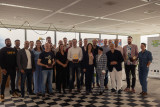
Almere, 6 juli 2023 – Civity is de winnaar van de Green Innovation Hub Contest 2023, waar verschillende start- en scale-ups hun innovatieve oplossing voor een duurzame en inclusieve leefomgeving presenteerden. Dat bepaalde de jury (UPAlmere!, Amsterdam Smart City, BTG, Future City Foundation, Floor Almere, Windesheim, Aeres, Provincie Flevoland, PRICE, Horizon en VodafoneZiggo) gisteren tijdens de Green Innovation Hub Contest tijdens een stormachtige dag. Na een succesvolle pitch won de start-up uit Amersfoort de Golden Award voor hun innovatieve oplossing: een smartcity dataplatform voor de energietransitie. Hiermee verzekert Civity zich van begeleiding om haar concept verder te ontwikkelen, kantoorruimte en tickets voor de Smart City Congres 2023 in Barcelona.
De komende jaren worden er in de provincie Flevoland 130.000 nieuwe woningen gebouwd.. Nederlands grootste bouwopgave. Daarom hebben de gemeente Almere, de provincie Flevoland, VodafoneZiggo en haar partners de handen ineengeslagen met de organisatie van de Green Innovation Hub Contest 2023. Het doel van de wedstrijd is het vinden van innovatieve oplossingen die bijdragen aan een duurzame en inclusieve leefomgeving.
“We zitten in de grootste transitie van de afgelopen 50 jaar, waarin we zowel op ruimtelijk als op sociaal gebied uitdagingen hebben. Het is mooi dat de Green Innovation Hub Contest hier met nieuwe organisaties en nieuwe ideeën mee aan de slag gaat en dat Almere blijft geloven en investeren in groene innovatie.”, aldus hoofdjurylid Jan-Willem Wesselink, programmamanager bij Future City Foundation.
Contest Day
Start-ups en scale-ups konden zich tot 22 juni aanmelden. Uit alle inzendingen heeft de jury tien organisaties met de beste oplossingen geselecteerd. Zij hebben hun producten en diensten gisteren tijdens de Innovation Hub Contest Day gepresenteerd.
“De inspirerende oplossingen die zijn gepresenteerd, dragen allemaal bij aan de ontwikkeling van Almere als een duurzame en natuur-inclusieve stad.” vertelt jurylid Debby Kruit, Ecosystem Advisor UPALMERE! en Startup Mentor bij Startupbootcamp. “Ik kan niet wachten om te zien welke innovaties over een tijdje echt in Almere worden gerealiseerd.”
Golden Award
De oplossing van Civity werd tijdens de finale van de Green Innovation Hub Contest door de jury bekroond met de Golden Award. Dit betekent dat zij meegaan met de partners naar de Smart City Congres in Barcelona en dat zij coaching en ondersteuning ontvangen om hun product verder op te schalen in de markt.
Arjan Eeken, senior Architecture manager en innovatiestrateeg bij VodafoneZiggo: “De presentatie ging niet in op de technologische oplossing, maar op de toegevoegde waarde voor de maatschappij. De meest belangrijke discussie die er is: hoe deel je data voor de energieconsumptie.”
Directeur Roelof Schram van Civity is erg opgetogen: ”Hiermee zetten wij met ons bedrijf een fantastische volgende stap om onze smartcity dataplatform samen met experts verder op te schalen”.
Call for Social Innovators: Join the SoTecIn Factory for Circular Economy Solutions in Agrifood, Textiles, Plastics & Packaging Industries!
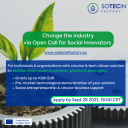
Exciting opportunity for all social innovators! SoTecIn Factory calls individuals and organizations in the agrifood, textiles, plastics & packaging industries with tech solutions based on circular economy & social innovation!
SoTecIn supports mission-driven circular ventures in leading the industry towards a low-carbon and circular economy transition through sustainable solutions, utilising higher R circular strategies. We provide up to 100k EUR in funding, help you to get to a pre-market demonstration, and provide capacity-building and mentorship.
Is this interesting for you or for someone in your network? Make sure to apply or share this with them!
Apply here: https://lnkd.in/eJnjfpDS
Find out more about the program: https://lnkd.in/exTueWti
Smart City tips for an innovative summer in Amsterdam
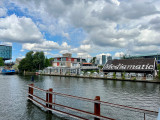
Whether you’re a visitor exploring Amsterdam, or a local opting for a staycation this summer, boredom is not on the agenda. There are some great things to do and see if you’re interested in innovation and sustainability. Delve into my curated list of smart city summer tips with exhibitions, activities and experiences from our partners and community. Zigzag across the city and discover the city from a different perspective!
1. Discover the city as a living place at the Landscape festival: ‘Met andere ogen’ (with other eyes)
Nature is a source of beauty and comfort, of relaxation and well-being, but it is now also in crisis. Diversity is declining and habitats are disappearing. In the ecological recovery lying ahead, the city plays a remarkable role: not only as a hotspot for biodiversity, but also as a meeting place where we can forge links between human and other life. Waag Futurelab invites you to set your sights on the Amsterdam Science Park and discover the city as a living place, together with artists, local residents and scientists. Take a walk along the walking route across the Amsterdam Science Park past all the installations and interventions.
From June until September 2023. Pick up a map at Café-Restaurant Polder (address: Science Park 201). Costs: free.
2. Take an architectural summer walk through new city areas
Arcam, the centre for architecture in Amsterdam, organises a series of architectural walks through neighbourhoods in development: Houthaven, Sloterdijk, Zuidas, Centrumeiland and Elzenhagen-Zuid. On Sundays from June to September, you can join a summer walk, led by an enthusiastic city expert, to visit and learn more about newly (to be) transformed areas of Amsterdam.
Every Sunday (from June to September) from different pick-up points. Costs: € 15,00 per person.
3. Fix your broken stuff at Repair Café Oud Noord
Give your broken belongings a second chance at the Repair Café in De Ceuvel (Metabolic Lab). Whether it's electronics, textiles, furniture, or bikes, the dedicated team at the Repair Café is there to assist with even the most challenging repairs. Join this community-driven initiative on the first Wednesday of each month! While the repairs are free, donations for used materials are warmly appreciated.
Every first Wednesday of the month (next up August 2, from 18:00-20:00) at De Ceuvel, Metabolic Lab. Costs: Free.
4. Green up your city with the NK Tegelwippen (‘National Tile Removal Championship’)
In the Netherlands, it's common to see apartment buildings, offices, and homes surrounded by tiles. This might be low-maintenance, but they're not particularly beautiful and do absolutely nothing to help the environment. We’re increasingly facing problems such as heat stress and flooding, and all those stone tiles in urbanised areas do not cool down on a hot day or let water through when it rains. Join the National Tile Removal Championship this summer! Remove tiles (for example in your garden) and replace them with plants and flowers for a greener city.
From March 21st till October 31st, more information via the website of NK Tegelwippen.
5. Learn more about our energy addition at the Energy Junkies exhibition
Our dependence on fossil fuels and the effects of our energy consumption on climate change are the focus of NEMO’s new exhibition for adults: Energy Junkies. NEMO invites you to explore the decisions that will determine our future. How would you transform our energy addiction into a healthy habit? Create your own carbon diet, choose the right medicines from the climate pharmacy and dream about a world where we are cured of our energy addiction. Visit Energy Junkies at NEMO’s Studio, the off-site location for adults on the Marineterrein in Amsterdam.
Energy Junkies is open from Wednesday – Sunday, from 12:00 – 17:30 until October 29. Costs: € 7,50
6. Visit the Maker Market
Meet passionate and innovative makers from all over the world at The Maker Market! Here you will find handmade products produced with love and craftsmanship. The event focuses on sustainable production processes and Fair Trade. Engage with the makers, hear their stories, and witness their creative processes. This way, you can discover products with a good story.
On Saturday July 28 (11:00-17:00), Sunday July 28 (12:00-17:00), Saturday August 26 (11:00-17:00) and Sunday August 27 (12:00-17:00) at the Passage. Costs: Free.
7. Book a tour at Mediametic
Get a glimpse behind the scenes at Mediametic! During their weekly tour on Friday, you’ll get the chance to peek inside their labs, in which they explore the possibilities of bio-materials for design, science and art. You’ll also visit the Clean lab, where Mediametic is currently focusing on the use of waste materials, as a source for new material. You get an introduction in the Aroma lab, their open perfume workshop and scent library where scent is explored as an artistic medium. And you will get to see the Plant lab, where herbs and edible flowers are grown for the restaurant in a sustainable way.
On Friday’s at 16:00, Mediametic. Costs: € 4,50 incl. a drink.
8. Keep your head cool! At Waag Open
It's getting hot in here! Since 1923, the KNMI (The Royal Netherlands Meteorological Institute) measured 28 heat waves and almost half them occurred in the past 20 years. If this trend continues, the number of 'tropical' days (days above 30 degrees) will have doubled by 2050. But what are the consequences of these heat waves in people's homes? In countless Dutch (rental) homes, bedrooms heat up considerably in summer. And that can lead to physical and mental complaints: heat stress. During Waag Open: Keep your head cool, Lisanne Corpel (researcher at the Hogeschool van Amsterdam) shares her knowledge on measuring heat and the phenomenon of heat stress.
Thursday August 3 from 19:30-21:30 at Waag, Nieuwmarkt 4. Costs: € 7,50 incl. a drink.
As you explore these smart city summer tips in Amsterdam, let the innovative initiatives inspire you to make positive changes in your own life. Be sure to check out our platform for more exciting events and experiences. Do you have any other tips for inspiring smart city activities not to be missed this summer? Share them with the community in the comments!
Science-based targets for nature: Setting ambitious and effective goals for biodiversity

Preserving and reviving nature plays a crucial role in addressing climate change and biodiversity loss. But determining the starting point and measuring progress can be challenging.
Science-based targets offer a starting point to take concrete actions toward a sustainable future.
Setting SBTs enables companies to transform vague intentions into specific commitments. Imagine going from "We should do something with water" to "We aim to reduce water consumption in high-stress regions by 25% before 2030 through rainwater catchment and increased reuse." Science-based targets provide a clear direction and roadmap for achieving such goals.
If you’re interested in learning more about how science-based targets can drive positive change and contribute to a sustainable future, check out Metabolic's latest article. We explore SBTs and their impact on biodiversity and nature.
#Sustainability #ScienceBasedTargets
Nature Assessments Solution: Introducing Link by Metabolic Software
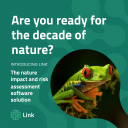
This week, Metabolic launched its first SaaS solution: Link, by Metabolic Software!
After 10 years of helping organizations understand their impact on nature, Metabolic has created a way to automate this process to help more people faster.
Link enables companies to understand their impact and identify nature-related risks across their supply chain. It helps them mitigate negative effects, protect biodiversity, and find opportunities for sustainable initiatives
#natureassessment #LinkbyMetabolic
New research on Smart Building Maintenance

Interested in hearing more about Smart Building Maintenance? Feel welcome to join the public defense of the PhD thesis “Crafting Intrapreneurial Stewardship – An institutional perspective on client-led innovation in smart building maintenance“ by Koos Johannes, PhD student in the department of Construction Management. The defense will take place on the 16th of January at 10:30 AM at the Waaier building at the campus of the University of Twente.
About the the PhD thesis
Available research suggests that construction clients, as building owner-occupier, are struggling to implement smart maintenance. This thesis assumes that these reported problems are due to a failure to fully understand the institutional complexities of smart maintenance commissioning in organizational networks. Hence, the aim of this thesis was to improve our understanding of these complexities and to develop theoretical and practical knowledge on the professionalization of construction clients in commissioning smart maintenance through stewardship. Stewardship theory portrays managers and employees as collectivists, pro-organizational and trustworthy, and can be used for designing collaborations based on intrinsic motivation and trust.
The defense will take place on the 16th of January at 10.30 AM at the Waaier building at the campus of the University of Twente.
A summary of the thesis can be read here.
If you want to receive a copy of the thesis, please send a message to: k.johannes@hva.nl
The presentation and defense will be in English; a Dutch summary is available.
Address: Hallenweg 25, 7522 NH, Enschede (see map for parking on the Campus; with public transport the Campus can be reached from train stations Hengelo or Enschede).
Amsterdam ontvangt 40 burgemeesters van wereldsteden voor innovatie-top

Amsterdam verwelkomt op 9 oktober meer dan 40 burgemeesters van middelgrote en grote steden uit de hele wereld. Op de 3-daagse mondiale stedentop Bloomberg CityLab, gaan zij samen met experts aan de slag met oplossingen voor grote- stadsproblemen.
Het gaat over stedelijke problemen en slimme innovaties. Op het gebied van bijvoorbeeld klimaatverandering, digitalisering, toerisme, een duurzame economie, de opvang van vluchtelingen, pandemieherstel en het fietsverkeer. En meer. Burgemeesters van grote steden als Mexico City, Athene, San Francisco, Washington en Bogota doen mee. De top brengt burgemeesters en directeuren in contact met prominente stadvernieuwers, experts, ondernemers, kunstenaars en activisten.
Wat heeft Amsterdam te bieden?
Naast paneldiscussies, interviews, interactieve sessies en culturele optredens (van onder meer Wende Snijders) gaan de deelnemers ook op excursie naar unieke bestemmingen in Amsterdam. Zij gaan met eigen ogen zien wat Amsterdam zoal te bieden heeft aan oplossingen voor grote stedelijke vraagstukken.
Hét innovatieterrein
Allereerst gaan zij naar het Marineterrein, hét innovatieterrein van de stad. Hier worden ideeën bedacht en vinden experimenten plaats die toepassing vinden in de publieke ruimte.
Zelfvarende boot
Denk aan een zelfvarende boot. Amsterdam krijgt ’s werelds eerste vloot van zelfvarende boten. Zij kunnen helpen om de druk op kades en bruggen te verminderen door goederen, afval en personen te vervoeren. Nu wordt de eerste grote zelfvarende boot getest.
Niet een groen maar een blauwgroen dak
Er loopt een wetenschappelijke proef met een blauwgroen dak. Dit dak slaat hemelwater op en gebruikt dat opnieuw voor begroeiing op het dak. Het geeft veel meer verkoeling dan een gewoon groen dak en helpt goed tegen het warmer worden van de stad. Dat laatste komt door de klimaatverandering.
BuurtHub
Op het Marineterrein is een zogeheten BuurtHub waar Amsterdammers op elk moment een elektrisch voertuig kunnen huren. Zoals elektrische fietsen, bakfietsen, scooters, auto’s en brommers. Amsterdam heeft 17 van deze BuurtHubs.
Drones en camera’s met meer oog voor privacy
Verder zijn we in Amsterdam aan de slag met nieuwe oplossingen zoals camera’s die de drukte meten en tegelijk de privacy van bewoners beter beschermen, testvluchten met drones en het circulair maken van de stad. Drones kunnen bijvoorbeeld medicijnen vervoeren, of een brand signaleren.
Andere plekken bezoeken
Ook gaan de deelnemers naar andere inspirerende plekken in de stad. Zoals De Waag Fab Lab, de Johan Cruijff Arena en het Rijksmuseum. Verder zijn er een boottocht, fietstochten en een avondtour vanwege de Nachtvisie van Amsterdam.
Wereldtoneel
CityLab 2022 onderzoekt de nieuwe rol van steden als actoren op het wereldtoneel. Het doel is de nieuwe werkelijkheid van steden te ontdekken, te vieren en te verspreiden. En de reactie vorm te geven op grote, actuele problemen.
Stedentop
Eerdere CityLab-conferenties zijn georganiseerd in New York, Los Angeles, Londen, Miami, Parijs, Detroit en Washington. D.C. Bloomberg CityLab is een jaarlijkse mondiale stedentop van Bloomberg Filantropies samen met het Aspen Institute.
Meer
Meer weten over wat Amsterdam doet aan innovatie in de stad? Ga naar amsterdam.nl/innovatie.
Foto: Sjoerd Ponstein
SoTecIn Factory
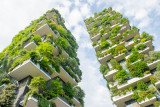
SoTecIn Factory is launched!
Committed to improving the resilience and sustainability of European industry, SoTecIn Factory will support the transformation of industrial value chains to become low-carbon and circular.
Our goal? Build 30 mission-driven ventures distributed in 20+ European countries!
Make sure to follow their journey through SoTecIn Factory and find out more about the projects here: https://sotecinfactory.eu/
Stay up to date
Get notified about new updates, opportunities or events that match your interests.

